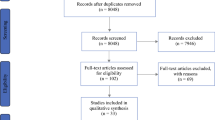Abstract
Purpose
The aim of this study was to investigate the effect of chest physiotherapy (CP) applied to patients undergoing bariatric surgery on pulmonary functions, dyspnea levels, functional capacity, and quality of life.
Methods
The patients were randomized and divided into two groups each comprising 74 patients. CP and mobilization was applied to the patients in the first group, and only mobilization was applied to the patients in the second group. The treatment of the patients was started on the first postoperative day and continued until the postoperative 4th day. CP and mobilization were applied twice a day, 8 times in total. The following parameters were evaluated: arterial blood gas, oxygen saturation, respiratory function test for pulmonary functions, pulmonary artery pressure for pulmonary hypertension, Borg dyspnea score for severity of dyspnea, 6-min walk test(6MWT) for functional capacity, Nottingham Health Profile for quality of life.
Results
The mean age of the patients was 38.00 ± 7.04 years. Compared with pretreatment and posttreatment dyspnea score, 6MWT, oxygen saturation, vital capacity, tidal volume, PEF, pulmonary arterial pressure, and quality of life were significantly higher in patients who underwent CP compared with the control group(p = 0.008, 0.004, 0.005, 0.027, 0.029, 0.028, 0.007, 0.012).There was a significant improvement in all the parameters of the patients who underwent chest physiotherapy when compared with the intragroup comparisons, whereas in the control group, only 6MWT and quality of life score showed a significant improvement in the border (p = 0.037, 0.046).
Conclusion
Postoperative CP applied to patients who had bariatric surgery showed that the patients improved their respiratory functions, regulated arterial blood gases, increased oxygen saturation, functional capacity and quality of life, and decreased dyspnea levels.
Similar content being viewed by others
References
Wei YF, Wu HD. Candidates for bariatric surgery: morbidly obese patients with pulmonary dysfunction. J Obes. 2012;1:1–6.
Rabec C, Ramos PL, Veale D. Respiratory complications of obesity. Arch Bronconeumol. 2011;47:252–61.
van Huisstede A, Biter LU, Luitwieler R, et al. Pulmonary function testing and complications of laparoscopic bariatric surgery. Obes Surg. 2013;23(10):1596–603. https://doi.org/10.1007/s11695-013-0928-9.
Veloso APLR, Cusmanich KG. Evaluation of the thoracoabdominal mobility of obese subjects in pre-bariatric surgery. Arq Bras Cir Dig. 2016;29:1:39–42.
Forti E, Ike D, Barbalho-Moulim M, et al. Effects of chest physiotherapy on the respiratory function of postoperative gastroplasty patients. Clinics (Sao Paulo). 2009;64(7):683–9. https://doi.org/10.1590/S1807-59322009000700013.
Ries AL. Pulmonary rehabilitation: summary of an evidence-based guideline. Respir Care. 2008;53(9):1203–7.
ATS statement. Guidelines for the six-minute walk test. Am J Respir Crit Care Med. 2002;166:111–7. https://doi.org/10.1164/ajrccm.166.1.at1102.
Khair RM, Nwaneri C, Damico RL, et al. The minimal important difference in Borg dyspnea score in pulmonary arterial hypertension. Ann Am Thorac Soc. 2016;13(6):842–9.
Hunt SM, McKenna SP, McEwen J, et al. The Nottingham Health Profile: subjective health status and medical consultations. Soc Sci Med A. 1981;15(3 Pt 1):221–9.
Kücükdeveci AA, McKenna SP, Kutlay S, et al. The development and psychometric assessment of the Turkish version of the Nottingham Health Profile. Int J Rehabil Res. 2000;23(1):31–8. https://doi.org/10.1097/00004356-200023010-00004.
Piskin O, Altinsoy B, Cimencan M, et al. The effect of bariatric anaesthesia on postoperative pulmonary functions. J Pak Med Assoc. 2017;67(4):561–7.
Oliveira JJJ, Freitas ACT, Almeida AA. Postoperative effect of physicaltherapy related to functional capacity and respiratory muscle strength in patients submitted to bariatric surgery. Arq Bras Cir Dig. 2016;29(1):43–7.
Guimarães C, Martins MV, Santos JM. Pulmonary function tests in obese people candidate to bariatric surgery. Rev Port Pneumol. 2012;18(3):115–9. https://doi.org/10.1016/j.rppneu.2012.01.005.
Wei YF, Tseng WK, Huang CK, et al. Surgically induced weight loss, including reduction in waist circumference, is associated with improved pulmonary function in obese patients. Surg Obes Relat Dis. 2011;7(5):599–604. https://doi.org/10.1016/j.soard.2011.04.221.
Hedenstierna G, Edmark L. The effects of anesthesia and muscle paralysis on the respiratory system. Intensive Care Med. 2005;31:1327–35. https://doi.org/10.1007/s00134-005-2761-7.
von Ungern-Sternberg BS, Regli A, Reber A, et al. Comparison of perioperative spirometric data following spinal or general anaesthesia in normal-weight and overweight gynaecological patients. Acta Anaesthesiol Scand. 2005;49:940–8. https://doi.org/10.1111/j.1399-6576.2005.00754.x.
Borges-Santos E, Genz IC, Longo AF, et al. Pulmonary function, respiratory muscle strength and quality of life in patients submitted to elective thoracotomies. Rev Col Bras Cir. 2012;39:4–9. https://doi.org/10.1590/S0100-69912012000100003.
Baltieri L, Santos LA, Rasera-Junior I, et al. Use of positive pressure in pre and intraoperative of bariatric surgery and its effect on the time of extubation. Rev Bras Anestesiol. 2015;65(2):130–5.
Franco AM, Torres FCC, Simin ISL, et al. Assessment of non invasive ventilation with two levels of positive airway pressure in patients after cardiac surgery. Rev Bras Cir Cardiovasc. 2011;26(4):582–90. https://doi.org/10.5935/1678-9741.20110048.
Casali CCC, Pereira APM, Martinez JAB, et al. Effects of inspiratory muscle training on muscular and pulmonary function after bariatric surgery in obese patients. Obes Surg. 2011;21:1389–94. https://doi.org/10.1007/s11695-010-0349-y.
Rocha MRS, Souza S, Costa CM, et al. Airway positive pressure vs. exercises with inspiratory loading focused on pulmonary and respiratory muscular functions in the postoperative period of bariatric surgery. Arq Bras Cir Dig. 2018;31(2):e1363. https://doi.org/10.1590/0102-672020180001e1363.
Lloréns J, Rovira L, Ballester M, et al. Preoperative inspiratory muscular training to prevent postoperative hypoxemia in morbidly obese patients undergoing laparoscopic bariatric surgery. A randomized clinical trial. Obes Surg. 2015;25:1003–9. https://doi.org/10.1007/s11695-014-1487-4.
de Souza SA, Faintuch J, Fabris SM, et al. Six-minute walk test: functional capacity of severely obese before and after bariatric surgery. Surg Obes Relat Dis. 2009;5(5):540–3. https://doi.org/10.1016/j.soard.2009.05.003.
Villiot-Danger JC, Villiot-Danger E, Borel JC, et al. Respiratory muscle endurance training in obese patients. Int J Obes. 2011;35:692–9. https://doi.org/10.1038/ijo.2010.191.
Xavier MA, Ceneviva R, Terra Filho J, et al. Pulmonary function and quality of life in patients with morbid obesity six months after bariatric surgery. Acta Cir Bras. 2010;25(5):407–15. https://doi.org/10.1590/S0102-86502010000500005.
Author information
Authors and Affiliations
Corresponding author
Ethics declarations
Conflict of Interest
The authors declare that they have no conflicts of interest.
Additional information
Publisher’s Note
Springer Nature remains neutral with regard to jurisdictional claims in published maps and institutional affiliations.
Rights and permissions
About this article
Cite this article
Duymaz, T., Karabay, O. & Ural, I.H. The Effect of Chest Physiotherapy After Bariatric Surgery on Pulmonary Functions, Functional Capacity, and Quality of Life. OBES SURG 30, 189–194 (2020). https://doi.org/10.1007/s11695-019-04165-z
Published:
Issue Date:
DOI: https://doi.org/10.1007/s11695-019-04165-z




